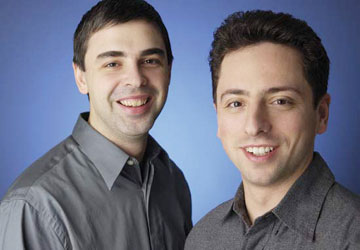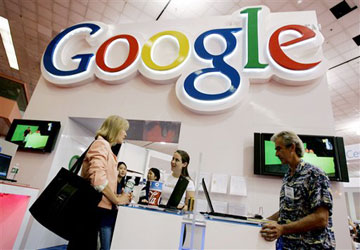Celebrating Google's 19th birthday, please review Google's 'childhood'
How Google was "conceived" and had a "childhood" when its "parents" - the two founders - initially seemed to "dislike each other". Please read back in time, back to 19 years ago to look back at Google's birth process.
- The 'evolutionary' history of the Google logo
Larry thought Sergey was arrogant. Sergey thought Larry was annoyed. But the obsession with links (links) brought them together, co-founding a famous search group.
Two founders quarreled constantly
It all started with an argument. When she first met Larry Page in the summer of 1995, Sergey Brin was a sophomore in Computer Science at Stanford University. Brin, naturally, loves to play, socialize, and volunteer to be a "volunteer student", helping first-year students during the admission process. Page, an engineering student at the University of Michigan, entered Brin's group.
" First impression " is not good at all. Two people constantly quarrel, argue, about many issues, including the value of urban planning. " Brin is very social, good at communication, he likes to meet people, " Page recalls, contrary to the quiet, quiet talk of Page. " I think he is arrogant. He has very strong opinions about everything. "
" We both noticed the proud man, " Brin countered when he learned of Page's reaction. " But we said it was just a joke. Obviously, we spent a lot of time talking to each other, so there was a generic product. We were always making fun of everything ." Page and Brin should have been "together", but they both made each other's blades sharper.

Starting from the Page essay
Several months later, Page began searching for a topic for his essay. This is an important decision, when Page was announced - as a computer science professor at Michigan State, saying that the essay could form the whole writer's career. Page picked out about 10 comments and found it attracted to the World Wide Web.
Page found the web appealing because of its mathematical properties. Each computer has a node and each link on a web page has a connection between the nodes - this is a giant graph structure. World Wide Web, Page reasoning, may be one of the largest graphs on earth and it is growing at a speed too fast. Page began to think about the Web's structural links.
In January 1996, Page embarked on the first search engine project called BackRub. At that time, the Web had about 10 million documents and a number of links (not many) linked between these documents. Not knowing exactly where it will go, Page started building its own project.
The complexity and scale of the BackRub project attracted Brin. As an intelligent person who has been involved in many projects, Brin discovered the premise behind the charming BackRub. "I talked to many research groups" at school, Brin recalls, " and this is the most exciting project I like to do, just because it relates to the Web - representing human knowledge - both because I like Page ".
In March 1996, Page performed his project with a single page - the home page - at Stanford. Thankfully, Page has now worked with Brin. Brin is the son of a NASA scientist and a professor of mathematics at the University of Maryland. He was born in Russia, migrated to the United States with his family when he was 6 years old. When Brin was a high school student, he was recognized as a math prodigy. He left high school a year early to attend the University of Michigan. Upon graduation, he immediately enrolled in Stanford. Here, with his talent, Brin is allowed to " do nothing ". " That's great, " Brin said, giving this privilege to Brin to participate in "unscientific" classes such as sailing, swimming, diving. And he focused his smart ability on interesting projects rather than on school.
Together, Page and Brin create a ranking system, rewarding websites with multiple links and punishing sites that do not have links. For example, many websites link to IBM.com. These links could be from a technology business partner, or a teen programmer who just bought a ThinkPad for Christmas. From a human perspective, business partners are an important link with IBM's position in the world. But how does an algorithm understand that?
Page and Brin's breakthrough is to create an algorithm - the name is PageRank. Going back to the above example, suppose only a few pages link to the boy's page. In contrast, there are thousands of link pages to Intel and these sites, on average, have thousands of other pages linking to them. At this time, PageRank will rank the teen programmer's page less important than Intel's website.
Gradually, BackRub becomes a search engine. Page and Brin found that BackRub's results were better than the search engines at the time - AltaVista and Excite, always giving irrelevant results. " The search engines AltaVista and Excite only pay attention to the text (text), but do not pay attention to other signals, " Page recalls. Another signal is PageRank. At this time, Page and Brin knew they needed to move toward something bigger.
The two founders named their search engine Google. They published the first Google version on Stanford University's website in August 1996 - one year after the two met.
"Childhood" Google must borrow, borrow, and stay
Google became famous in Stanford. As with energy, Brin and Page began to upgrade the service. They quickly realized that search engines needed a large amount of computers. There was no money to buy a new machine, they asked, borrowed a hard drive from a network lab, an excess CPU of the department. Using Page 3 the dormitory in Page's university as a lab and after filling up the equipment in Page's bedroom, they transferred Brin's bedroom into an office and programming center.

They hooked everything up into Stanford University's broadband network. At that time, the project of two people "consumed" nearly half the bandwidth of the entire Stanford network, while Stanford was one of the best networked schools on the planet. In the fall of 1996, their project kept interrupting Stanford's Internet connection. In fact, the search engines of the two used Stanford University's website with the domain google.stanford.edu.
" We are fortunate to have been supported by many Stanford people, " Page recalls. " They don't reprimand the resources we use too much ."
Professor Jon Kleinberg of Cornell University is very interested in Page and Brin's work. He advised Page to publish research on PageRank in a scientific newspaper. But Page said he was afraid to publish, publish. The reason is " I'm afraid someone might steal your idea and with PageRank, Page feels like you have a secret recipe ," Kleinberg said.
On the other hand, Page and Brin also wanted to experience the hardships of establishing and running a company. However, they finally published their work and the domain name google.com registered on September 15, 1997, according to the Wikipedia encyclopedia website. The two officially established Google Inc on September 7, 1998 in a friend's garage in California. Their office also has a washing machine, a drying machine and a hot tub. In addition, the office also has parking for the first employee Google recruits: Craig Silverstein - later to become Google's technology director.
At that time, the Google.com website, still in beta, received about 10,000 search commands every day. Newspapers began to pay attention to the brand new website that always showed search results related to the topic. Articles extolling Google appear on USA Today and Le Monde. In December of that year, PC Magazine called Google one of their top 100 websites and search engines in 1998. On September 21, 1999, the new beta brand was removed from Google.com. Google gradually reached the world.
In the following years, the company continuously expanded, hired more engineers, built a sales team. Google got out of the garage and eventually moved to its current headquarters, known as the Googleplex in Mountain View, California.
The name "Google" comes from a misspelling of the word "Googol", meaning that the number 1 is followed by 100 zeros. Today, "google" has become a verb. In the Oxford English Dictionary in 2006, the word "google" is defined as " using a Google search engine to get information on the Internet ".
The constant search for better answers for users continues to be the core of everything Google does. With over 60,000 employees from over 50 different countries, Google has helped bring millions of products to billions of users worldwide, from YouTube, Android to Smartbox and of course Google Search. The passion of creating technology for everyone always exists in every person at Google, which is the spirit that Google always preserves and promotes throughout its history of development.
Happy 19th birthday of Google. Happy birthday to Google!
See also: 13 quick Google search tips you should know